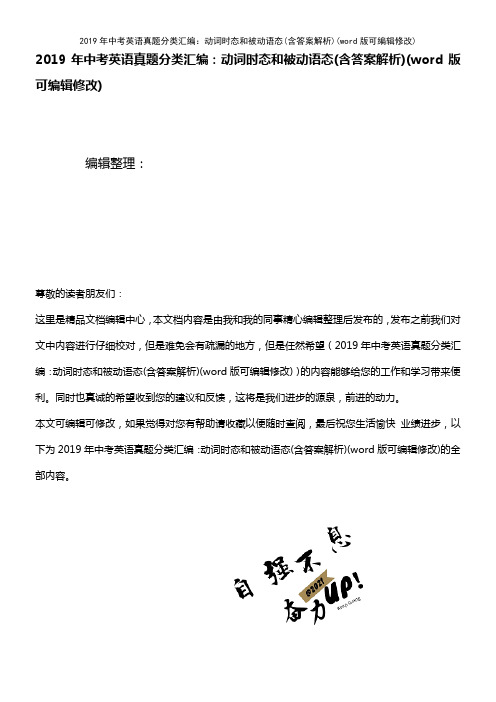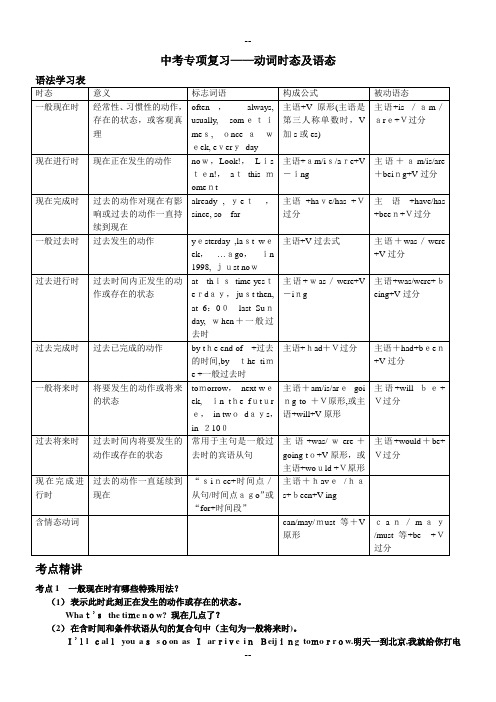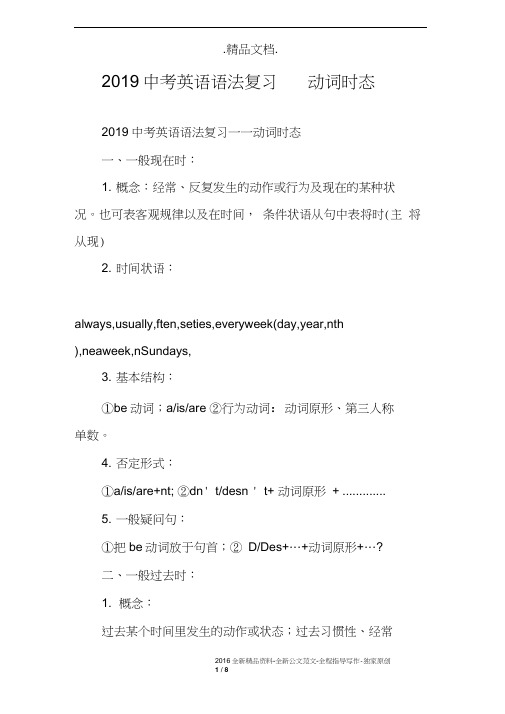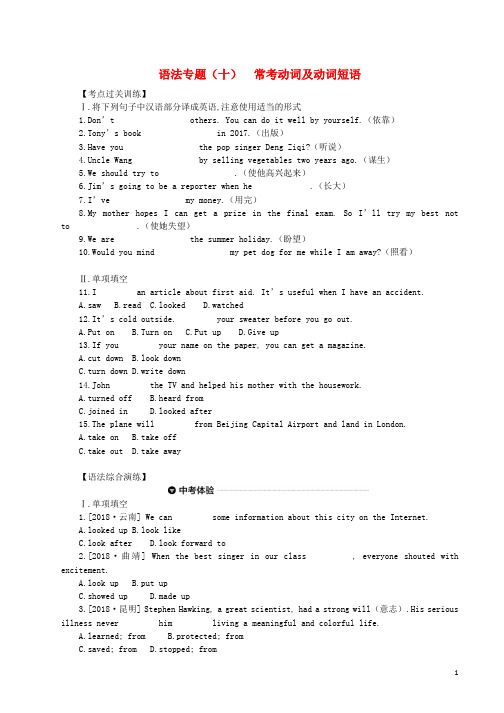2019年中考英语(毕节)总复习语法专题讲义:专题10 动词的时态
2019年中考英语真题分类汇编:动词时态和被动语态(含答案解析)(K12教育文档)

2019年中考英语真题分类汇编:动词时态和被动语态(含答案解析)(word版可编辑修改)编辑整理:尊敬的读者朋友们:这里是精品文档编辑中心,本文档内容是由我和我的同事精心编辑整理后发布的,发布之前我们对文中内容进行仔细校对,但是难免会有疏漏的地方,但是任然希望(2019年中考英语真题分类汇编:动词时态和被动语态(含答案解析)(word版可编辑修改))的内容能够给您的工作和学习带来便利。
同时也真诚的希望收到您的建议和反馈,这将是我们进步的源泉,前进的动力。
本文可编辑可修改,如果觉得对您有帮助请收藏以便随时查阅,最后祝您生活愉快业绩进步,以下为2019年中考英语真题分类汇编:动词时态和被动语态(含答案解析)(word版可编辑修改)的全部内容。
2019年中考英语单项选择题汇编(动词时态)7.I _____ scared of dogs ever since a dog hurt me when I was five years old。
(2018杭州)A。
will beB.wasC.have beenD.would be参考答案:C5.-Ben and Sue aren’t home, are they?-No. They _____ to London on business. (2018江西)A。
have goneB。
goC。
have beenD. will go参考答案:A18。
-Why did the car hit the boy?-Because the driver _____ on the phone at that time. (2018天津)A。
talkB. is talkingC. was talkingD。
have talked参考答案:C14。
-Where is Linda? I can’t find her anywhere.-She _____ the flowers in the garden. (2018三亚)A. watersB. wateredC. is watering参考答案:C6。
年中考英语专题复习动词时态及语态详解

中考专项复习——动词时态及语态考点精讲考点1 一般现在时有哪些特殊用法?(1)表示此时此刻正在发生的动作或存在的状态。
What’sthe time now? 现在几点了?(2)在含时间和条件状语从句的复合句中(主句为一般将来时)。
I’ll callyou assoon as Iarrive inBeijing tomorrow.明天一到北京,我就给你打电话。
(3)在主句为过去时态的复合句中,如果宾语从句陈述的是客观真理,从句用一般现在时。
The teacher said Maria is a girl.老师说玛利亚是个女孩。
(4)表示书、信、报纸、通知、广播、告示牌等的内容用一般现在时。
Itsays,“Closed”.上面写着,“停止营业”。
专练用所给动词的适当形式填空1、T hree plus two_________(be)five.2、There____________(go)thebell!3、Light______________(travel)fasterthan sound.4、Ifyou____________(ask)her tomorrow, she will helpyou.5、The notice_______________(say)“NoSmoking!”.考点2 如何使用used to?used to后加动词原形表示“过去常常”,其疑问句和否定句可直接使用used,也可借助于did。
I used to be afraidofdark .我过去常怕黑。
He usedn’tto rideto school.他过去不常骑车去上学。
He used tosmoke,didn’the?他过去常抽烟,是吗?注意:be used to doing 意为“习惯做某事”,be used todo 意为“被用来……”,不要混淆。
专练按要求变化下面的句型1、She used to play nearthe river.(改为否定句)__________________________________________________________________________2、T he childrendidn’tuseto come here early,_____________________?(补全反意疑问句)考点3 一般将来时有哪些形式?(1)“begoing to+动词原形”表示计划或打算在最近要做的事。
2019中考英语语法复习——动词时态

.精品文档.2019中考英语语法复习动词时态2019中考英语语法复习一一动词时态一、一般现在时:1. 概念:经常、反复发生的动作或行为及现在的某种状况。
也可表客观规律以及在时间,条件状语从句中表将时(主将从现)2. 时间状语:always,usually,ften,seties,everyweek(day,year,nth),neaweek,nSundays,3. 基本结构:①be动词;a/is/are ②行为动词:动词原形、第三人称单数。
4. 否定形式:①a/is/are+nt; ②dn' t/desn ' t+ 动词原形+ .............5. 一般疑问句:①把be动词放于句首;② D/Des+…+动词原形+…?二、一般过去时:1. 概念:过去某个时间里发生的动作或状态;过去习惯性、经常性的动作、行为2. 时间状语:ag,yesterday,thedaybefreyesterday,lastweek(year,night,nth …),in1989,ustnw,attheagef5,neday,lnglngag,ne upnatie,thisrning3. 基本结构:① be 动词;was/were …②行为动词:动词的过去式4. 否定形式:①was/were+nt;②didn ' t+ 动词原形5. 一般疑问句:①was或were放于句首;②Did+…+动词原形…三、现在进行时:1. 概念:表示现阶段或说话时正在进行的动作及行为。
2. 时间状语:nw,atthistie,thesedays,lk,listen,anyusee?an tyusee?之类的暗示语。
3. 基本结构:a/is/are+ding4. 否定形式:a/is/are+nt+ding.5. 一般疑问句:Is/Are …+dingsth?四、过去进行时:2016全新精品资料-全新公文范文-全程指导写作-独家原创2 / 81. 概念:表示过去某段时间或某一时刻正在发生或进行的行为或动作。
2019年中考英语语法总复习课件——动词时态语态(共48张PPT)

一般将来时 (6)下列几种情况只可用shall(will)表将来,而不可用be going to结构。 ①表示有礼貌地询问对方是否愿意或表示客气地邀请或命令时。 Will you please lend me your pen?请把你的钢笔借我用一下,好吗?
一般将来时 (6)下列几种情况只可用shall(will)表将来,而不可用be going to结构。 ②表示意愿时。 We will help him if he asks us. 如果他愿意,我们会帮助他。
现在完成时 (4)现在完成时与表示一段时间的for短语、since短语或从句等连用时,应注意句中 的谓语动词须是延续性的,而不能是非延续性动词, come→ be here,go→be there,die→be dead, borrow→ keep,buy→have,join→be in,leave→be away, begin to study→study
现在完成时 (5)have been to,have gone to,have been in 的用法区别: have been to 表示“过去曾去过某地”,说话时已从该地回来或已从该地去了其他 地方,总之,现在已不在该地; have gone to则表示“已去了某地”,说话时不在说话地点,或在去某地的途中, 或已到了某地,总之现在还未回来; have been in表示“已在某地待了多久”,后面跟副词时不用in。 --Where is Mrs Smith? 史密斯夫人在哪儿? --She isn't here.She has gone to England. 她不在这儿。她去了英国。
(只表明“一直在写”,不清楚“是否写完”,也许信还没有写完)
过去进行时 (3)常与过去进行时连用的时间状语有两类: 一类是表过去的“某点”时间,如at that time,this time,last week,“when he came in”类时间状语从句等; 另一类是表过去的“某段”时间,如yesterday morning等。 What were you doing at nine o'clock last Sunday morning? 上周日上午九点钟你在干什么? While John was walking to school,he saw a cat in a tree. 当约翰步行上学时,他看见一只猫在一棵树上。
(完整word版)中考英语专题 时态和语态

一般现在时2.一般过去时3.一般将来时4。
现在进行时5。
过去进行时6.现在完成时【考点内容】了解并能运用常考的六种时态,尤其熟练运用一般现在时、一般过去时、进行时等高频时态,正确辨析几种易混时态的区别。
,体现了对语法知识、语境理解、语言交际能力的综合考查.come-——comes speak-——speaks work———works live-——livesdo———does go--—goes finish———finishes brush--—brushesfix--—fixes pass——-passes watch—-—watchesStudy—--studies carry—carries cry—--criesplay———plays stay--—stays【2013中考真题训练】1.Your uncle will come to see you as soon as he _________ here. (arrive)( )2。
Our physics teacher told us light _______ faster than sound.A。
travels B。
traveled C。
traveling D。
to travel【2013重庆1】 It will be hard for us to get up in the morning if we ____to bed too late. A.go B。
went C。
will go D。
have gone【2013山东泰安1】—Do you know whether David will go cycling or not tomorrow?-David? Never! He _______ outdoor activities。
A。
hates B。
hated C. is hating D. has hated【2013辽宁鞍山1】 It only_______ him 20 minutes __________to his office every day。
2019年中考英语二轮复习第二篇语法突破篇语法专题10常考动词及动词短语练习

语法专题(十)常考动词及动词短语【考点过关训练】Ⅰ.将下列句子中汉语部分译成英语,注意使用适当的形式1.Don’t others. You can do it well by yourself.(依靠)2.Tony’s book in 2017.(出版)3.Have you the pop singer Deng Ziqi?(听说)4.Uncle Wang by selling vegetables two years ago.(谋生)5.We should try to .(使他高兴起来)6.Jim’s going to be a reporter when he .(长大)7.I’ve my money.(用完)8.My mother hopes I can get a prize in the final exam. So I’ll try my best not to .(使她失望)9.We are the summer holiday.(盼望)10.Would you mind my pet dog for me while I am away?(照看)Ⅱ.单项填空11.I an article about first aid. It’s useful when I have an accident.A.sawB.readC.lookedD.watched12.It’s cold outside. your sweater before you go out.A.Put onB.Turn onC.Put upD.Give up13.If you your name on the paper, you can get a magazine.A.cut downB.look downC.turn downD.write down14.John the TV and helped his mother with the housework.A.turned offB.heard fromC.joined inD.looked after15.The plane will from Beijing Capital Airport and land in London.A.take onB.take offC.take outD.take away【语法综合演练】Ⅰ.单项填空1.[2018·云南] We can some information about this city on the Internet.A.looked upB.look likeC.look afterD.look forward to2.[2018·曲靖] When the best singer in our class , everyone shouted with excitement.A.look upB.put upC.showed upD.made up3.[2018·昆明] Stephen Hawking, a great scientist, had a strong will(意志).His serious illness never him living a meaningful and colorful life.A.learned; fromB.protected; fromC.saved; fromD.stopped; from4.[2018·昆明] The government will take action to the problem of heavy extracurricular burden(课外负担)on primary and middle school students.A.decidingB.decideC.solvingD.solve5.[2017·曲靖] The idea of the Belt and Road China, but it belongs to the world.es fromes outes upes back6. [2016·云南] As long as all the Chinese people pull together, our China Dream will .e truee oute upe down7.[2017·昆明] As we on our new journey, we shouldn’t forget where we came from.A.take outB.set outC.cut outD.blow out8.[2017·云南] Tom, the baby is sleeping. Please the radio a bit.A.turn onB.turn offC.turn upD.turn down9.[2018·安徽] —I’m afraid I might forget to buy the bread after work.—Don’t worry.I will you then.A.noticeB.allowC.remindD.promise10.[2018·天津] I am afraid we can not to take a taxi.Let’s go by underground instead.A.refuseB.affordC.forgetD.fallⅡ.将下列句子中汉语部分译成英语,注意使用适当的形式11.[2018·云南] When you’re learning a new language, you can’t be afraid to ; otherwise, you won’t get very far.(出错)12.[2017·云南] Life isn’t about the storm to pass; it’s about learning to dance in the rain.(等候)13.[2017·昆明] In some countries, you’re supposed to with others for the first time.(握手)14.[2017·大理模拟] She often late with her mother to watch movies.(熬夜)15.[2018·曲靖模拟] One important way to achieve your dream is to it.(坚持)Ⅰ.单项填空1.My uncle is repairing some old bikes these days. He plans to to a charity.A.give them awayB.give them upC.take them awayD.pick them up2.You should try to the problems by yourself.You’re not a child any longer.A.get onB.get intoC.get overD.get off3.—It’s hot today, isn’t it?—Yes, it is. Why not your jacket?A.take careB.take placeC.take afterD.take off4.—If you always yourself with others, you may have tons of pressure.—I agree. We should believe in ourselves.pareplainC.connectD.consider5.—Don’t , my children. Keep working hard and you will win the match.—Thank you, Mr. Zhang. We’ll try our best.A.put upB.call upC.set upD.give up6.I like these photos and they can me the life living in the countryside.A.think; ofB.remind; ofC.let; downD.wake; up7.Don’t the bus until it stops.A.turn offB.put onC.get offD.set up8.Anyone who sings well can the activity in our school.A.take part inB.take offC.take outD.take care of9.I’m not sure whether I can hold a party in the open air, because it the weather.A.stands forB.depends onC.lives onD.agrees with10.—These problems are too hard to . Will you give me some advice?—There are many ways. The most important is to have a careful plan.A.work outB.look outC.hand outD.break outⅡ.根据句意,用括号中所给词的正确形式填空11.The glass was .You have to buy a new one.(break)12.If your vocabulary is not large enough, you can’t understand the of the passage well.(mean)13.The music really great.Tell me what its name is.(sound)14.When autumn comes, the ground is covered with leaves from the trees.(fall)15.Michael and his brother are in the same team and do some together.(train)16.It’s that the old man used to be a soldier.(say)17.I enjoy parties, because they are always and lively.(excite)18. down from the mountain top, you can clearly see the whole city.(look)19.Be careful not to get yourself when you use the knife.(cut)20.Parents were all concerned about the of their children at the meeting.(protect)Ⅲ.将下列句子中汉语部分译成英语,注意使用适当的形式21.Now more and more young people the elderly on the bus in our city. (让座)22.Scott and his wife usually morning newspapers before breakfast. (浏览)23.Study hard, or you will other students.(落后)24.—How do you usually go to work?—I usually go to work by bus. But sometimes I .(开车去上班)25.Now Chinese teenagers have plenty of chances all kinds of outdoor activities. (参加)参考答案【考点过关训练】Ⅰ.1.depend on 2.came out 3.heard of 4.made a living5.cheer him up 6.grows up 7.run out of8.let her down 9.looking forward to10.taking care of/looking afterⅡ.11—15 BADAB【语法综合演练】中考体验Ⅰ.1—5 ACDDA 6—10 ABDCBⅡ.11.make mistakes/make a mistake 12.waiting for13.shake hands 14.stays up 15.stick to能力训练Ⅰ.1—5 ACDAD 6—10 BCABAⅡ.11.broken 12.meaning 13.sounds 14.fallen15.training 16.said 17.exciting 18.Looking 19.cut20.protectionⅢ.21.give/offer their seats to 22.look through23.be left behind/fall behind 24.drive to work25.to take part in。
中考英语(毕节)总复习语法专题讲义:专题10 动词的时态-word

专题十动词的时态毕节五年中考命题规律及趋势近五年毕节中考考情分析2019年毕节中考命题预测年份考查角度考查重点题号分值预计2019年毕节中考对动词的时态的考查仍是重点,倾向于考查动词时态在具体语境中的用法,主要以单项填空、完形填空、短文改错的形式出现,考查的小题数约3—4道。
2018动词时态和语态的用法in 1973用一般过去时25 12019动词时态的用法since 2019用现在完成时29 12019动词时态的用法It's six o'clockin the morning.用现在进行时30 12019动词时态的用法every day用于一般现在时24 1动词时态和语态的用法last year用于一般过去时25 12019动词时态的用法现在完成时have been与have gone的用法区别22 1毕节中考考点突破动词的时态1.常见的八种时态的构成及用法名称用法动词形式(以do为例)常用时间状语例句一般现在时现在的状态;经常性或习惯性的动作;主语具备的性格或能力I/We/You/Theydo…He/She/It does…in the morning/afternoon/eveningtwice a monthevery day/morningon Sundaysalways,usually,often,sometimesI get up at 6:30every day.我每天六点半起床。
She likes swimming.她喜欢游泳。
一般过去时过去某时发生的动作或存在的状态;过去经常或反复发生的动作I/We/You/He/She/It/They did…yesterday(morning/afternoon)last night/Sundayin 1990two days agojust nowI got up at 6:30yesterday.我昨天六点半起床。
2019年中考英语(毕节)总复习语法专题讲义:专题11 动词的语态

专题十一 动词的语态 毕节五年中考命题规律及趋势近五年毕节中考考情分析2019年毕节中考命题预测 年份 考查角度 考查重点 题号 分值 预计2019年毕节中考对动词的语态的考查仍是重点,倾向于考查动词被动语态的用法,主要以单项填空、完形填空、短文改错的形式出现,考查的小题数约3—4道。
2018 动词的时态和语态的用法一般过去时的被动语态25 1 2017 / / / / 2016 / / / / 2015 动词的时态和语态的用法一般过去时的被动语态25 1 2014////毕节中考考点突破动词的语态1.动词语态的分类英语中有两种语态:主动语态和被动语态。
(1)主动语态表示主语是动作的执行者。
如: Many people speak English there.那儿很多人说英语。
(2)被动语态表示主语是动作的承受者,即行为动词的对象。
如:Chinese is spoken by many people.汉语被很多人说。
(Chinese 是动词speak 的承受者) 2.被动语态的构成被动语态由“助动词be +及物动词的过去分词(用done 表示)”构成。
常见的八种时态的被动语态结构及情态动词的被动语态如下:时态 被动语态结构 例句一般现在时 am/is/are + 过去分词 Chinese is spoken by manypeople. 一般过去时 was/were + 过去分词Chinese was spoken by manypeople. 一般将来时shall/will be +过去分词或am/is/are going to be +过去分词 Chinese will be spoken by many people.或:Chinese is going to bespoken by many people. 过去将来时(不常考) would be +过去分词或was/weregoing to be +过去分词 Chinese would be spoken by many people.或:Chinese was going to be spoken by manypeople.现在进行时(不常考)am/is/are being +过去分词Chinese is being spoken by manypeople.续表时态 被动语态结构例句过去 进行时 (不常 考) was/were being +过去分词Chinese was being spoken by many people.现在 完成时 (不常 考) has/have +been +过去分词Chinese has been spoken by many people.过去 完成时 (不常 考) had +been +过去分词Chinese had been spoken by many people.含有情 态动词 的被动 语态情态动词+be +过去分词Chinese must be spoken by many people.3.主动语态变被动语态的方法 (1)图示:(2)口诀:宾变主,主变宾,谓语动词用被动。
中考英语(毕节)总复习语法专题讲义:专题10 动词的时态

中考英语(毕节)总复习语法专题讲义:专题10 动词的时态专题十动词的时态毕节五年中考命题规律及趋势近五年毕节中考考情分析2019年毕节中考命题预测动词的时态1.常见的八种时态的构成及用法名称用法动词形式(以do为例)常用时间状语例句一般现在时现在的状态;经常性或习惯性的动作;主语具备的性格或能力I/We/You/Theydo…He/She/Itdoes…in themorning/afternoon/eveningtwice amontheveryday/morningon Sundaysalways,usually,often,sometimesI get upat 6:30everyday.我每天六点半起床。
She likesswimming.她喜欢游泳。
一般过去某I/We/You yesterday(I got up过去时时发生的动作或存在的状态;过去经常或反复发生的动作/He/She/It/Theydid…morning/afternoon)lastnight/Sundayin 1990two daysagojust nowat 6:30yesterday.我昨天六点半起床。
Healwayswent towork bybus lastyear.他去年经常乘公交去上班。
一般将来时将来某时间要发生的动作或存在的I shalldo…I'mgoing todo…tomorrow(morning/afternoon/evening)nextI will goto myhometown nextweek.我状态;将来经常或反复发生的动作We/You/They/He/She/Itwilldo…We/You/They aregoing todo…He/She/Itis goingto do…year/month/weekin thefuturesoonfrom nowon下周将会去我的家乡。
2019年中考英语(毕节)总复习语法专题研究课件:专题10 动词的时态 (共35张PPT)

中考题例及解析
考点抢测
中考命题规律及趋势
中考考点突破
中考题例及解析
考点抢测
中考命题规律及趋势
中考考点突破
中考题例及解析
考点抢测
中考命题规律及趋势
中考考点突破
中考题例及解析
考点抢测
中考命题规律及趋势
中考考点突破
中考题例及解析
考点抢测பைடு நூலகம்
中考命题规律及趋势
中考考点突破
中考题例及解析
考点抢测
中考命题规律及趋势
中考命题规律及趋势
中考考点突破
中考题例及解析
考点抢测
中考命题规律及趋势
中考考点突破
中考题例及解析
考点抢测
中考命题规律及趋势
中考考点突破
中考题例及解析
考点抢测
中考命题规律及趋势
中考考点突破
中考题例及解析
考点抢测
中考命题规律及趋势
中考考点突破
中考题例及解析
考点抢测
中考命题规律及趋势
中考考点突破
中考命题规律及趋势
中考考点突破
中考题例及解析
考点抢测
中考命题规律及趋势
中考考点突破
中考题例及解析
考点抢测
中考命题规律及趋势
中考考点突破
中考题例及解析
考点抢测
中考命题规律及趋势
中考考点突破
中考题例及解析
考点抢测
中考命题规律及趋势
中考考点突破
中考题例及解析
考点抢测
中考命题规律及趋势
中考考点突破
中考题例及解析
考点抢测
中考命题规律及趋势
中考考点突破
中考题例及解析
考点抢测
- 1、下载文档前请自行甄别文档内容的完整性,平台不提供额外的编辑、内容补充、找答案等附加服务。
- 2、"仅部分预览"的文档,不可在线预览部分如存在完整性等问题,可反馈申请退款(可完整预览的文档不适用该条件!)。
- 3、如文档侵犯您的权益,请联系客服反馈,我们会尽快为您处理(人工客服工作时间:9:00-18:30)。
专题十动词的时态毕节五年中考命题规律及趋势近五年毕节中考考情分析2019年毕节中考命题预测年份考查角度考查重点题号分值预计2019年毕节中考对动词的时态的考查仍是重点,倾向于考查动词时态在具体语境中的用法,主要以单项填空、完形填空、短文改错的形式出现,考查的小题数约3—4道。
2018动词时态和语态的用法in 1973用一般过去时25 12017动词时态的用法since 2016用现在完成时29 12016动词时态的用法It's six o'clockin the morning.用现在进行时30 12015动词时态的用法every day用于一般现在时24 1动词时态和语态的用法last year用于一般过去时25 12014动词时态的用法现在完成时have been与have gone的用法区别22 1毕节中考考点突破动词的时态1.常见的八种时态的构成及用法名称用法动词形式(以do为例)常用时间状语例句一般现在时现在的状态;经常性或习惯性的动作;主语具备的性格或能力I/We/You/Theydo…He/She/It does…in the morning/afternoon/eveningtwice a monthevery day/morningon Sundaysalways,usually,often,sometimesI get up at 6:30every day.我每天六点半起床。
She likes swimming.她喜欢游泳。
一般过去时过去某时发生的动作或存在的状态;过去经常或反复发生的动作I/We/You/He/She/It/They did…yesterday(morning/afternoon)last night/Sundayin 1990two days agojust nowI got up at 6:30yesterday.我昨天六点半起床。
He always wentto work by buslast year.他去年经常乘公交去上班。
一般将来将来某时间要发生的动作或存在I shall do…I'm going to do…We/You/They/He/tomorrow(morning/afternoon/evening)next year/month/weekI will go to myhometown next时的状态;将来经常或反复发生的动作She/It willdo…We/You/They aregoing to do…He/She/It is goingto do…in the futuresoonfrom now onweek.我下周将会去我的家乡。
I'm going toswim tomorrowafternoon.我明天下午将会去游泳。
续表名称用法动词形式(以do为例)常用时间状语例句现在进行时现在或当前一段时间内正在进行或发生的动作I'm doing…He/She/It is doing…We/You/They aredoing…nowat presentLook!Listen!Are they workingnow?他们正在工作吗?Look!They areplaying basketball.看!他们正在打篮球。
过去进行时过去某一时刻或某一段时间内正在进行的动作I/He/She/It wasdoing…We/You/They weredoing…this timeyesterdayat ten o'clock yesterdayat that timewhen he camebackat that momentWe were readingbooks in class thistime yesterday.昨天的这个时间我们正在教室读书。
I was drawing apicture when theteacher came in.当老师进来的时候我正在画画。
现在完成时过去发生或已经完成的某一动作对现在造成的影响或结果;表示过去已经开始并持续到现在的动作或状态He/She/It has done…We/You/They havedone…already,yet,just,before,never,everfor three yearssince 1990since I was bornthese daysin the past fiveyearsso farWe have known eachother for ten years.我们认识彼此有十年了。
Have you ever been toBeijing?你曾去过北京吗?续表名称用法动词形式(以do为例)常用时间状语例句过去完成时(近五年未考) 过去某一时间前已经发生的动作或状态I/We/You/He/She/It had done…by the end of…when+一般过去时before+一般过去时I had learned 2,000words by the end oflast term.到上学期期末,我已经学了2000个单词。
When I got out,thebus had already left.当我出门的时候,公交车已经开走了。
现在完成进行时(近五年未考) 过去的一段时间里一直进行的动作,这个动作可能仍在进行,也可能继续进行下去I/We/You/Theyhave been doing…He/She/It has beendoing…since nine o'clockfor five hoursI have been skatingfor five hours.我已经滑冰五个小时了。
She has been skatingsince nine o'clock.她从九点钟开始就一直在滑冰。
2.动词的五种基本形式变化表形式构成例词动词原形没有经过任何变形,就是词典中一般给出的形式be,do,have,come第三人称单数一般在动词原形后直接加-s work—worksread—reads 以s,o,x,z,sh,ch结尾的动词,后加esgo—goeswash—washes 以辅音字母加y结尾的动词,应将y改为i再加esfly—fliesstudy—studies规则动词的过去式与过去分词一般在动词原形后直接加-ed work—worked—workedstay—stayed—stayed在以e结尾的动词后只加-d close—closed—closedlike—liked—liked以辅音字母加y结尾的动词,应将y改为i再加edstudy—studied—studiedcarry—carried—carried 以双重闭音节结尾且末尾只有一个辅音字母的动词,双写此辅音字母再加edstop—stopped—stoppedplan—planned—planned现在分词一般在动词原形后直接加ing sleep—sleepingwait—waiting 以不发音的e结尾的动词,去e再加-ingsmile—smilingmove—moving 以重读闭音节结尾且末尾只有一个辅音字母的动词,双写此辅音字母再加-ingsit—sittingdig—diggingplan—planning 少数以ie结尾的动词,变ie为y,再加-ingdie—dyinglie—lying注意:常见的短暂性动词与延续性动词的转换短暂性动词延续性动词have closed/opened have been closed/openedhave died have been deadhave left have been awayhave begun/started have been onhave finished/ended have been overhave become have been续表短暂性动词延续性动词have borrowed have kepthave bought have hadhave joined have been a member ofhave come have been inhave left sp. have been away from sp.3.时态的运用学生在解题过程中,应掌握动词时态的判断技巧,如:(1)根据时间状语确定时态;(2)利用上下文语意判断句子的时态;(3)根据上下文已有的时态信息确定时态;(4)在复合句中根据时态呼应确定时态;(5)固定句型与动词时态间的对应关系;(6)根据特定动词与时态的对应关系;(7)根据时态中的“特殊”对策(如客观真理等)。
根据时间状语确定时态①now,at present,at the moment,these days,look,listen等标志着现在进行时。
②just now,…ago,in 1980,this morning,yesterday,the other day,used to,last night/week/month/year…等标志着一般过去时。
③at 1:00 last night,at that moment,at this time yesterday等标志着过去进行时。
④tomorrow,from now on,soon,in the future,next week/month/year…等标志着一般将来时。
⑤yet,just,before,recently,once,already,lately,ever,never,since 1996,for ten years等标志着现在完成时。
⑥除了上面这些时间状语提示时态外,某些副词也有这种作用,如often,always,usually,never,seldom等表示频度的副词应用一般现在时或一般过去时。
单项填空。
(C)1.(热点人物题)Last month I ______ to Jay Chou's concert.A.go B.have goneC.went D.am going(B)2.(人文信息题)—Have you ever been to the Bijie Museum(毕节博物馆)?—Yes.I ______ there twice.A.have gone B.have beenC.had gone D.had been(B)3.(2018北京中考)Bill likes reading.He ______ picture books with his dad every evening.A.read B.readsC.is reading D.has read(D)4.(2018南京中考)—We ______ to Yun Brocade Museum with the exchange students this coming summerholiday.—That's amazing!A.went B.goC.have gone D.will go(B)5.(2018重庆中考B卷)Listen! Mr.Black ______ a talk on robots in the hall.A.gives B.is givingC.will give D.gave毕节中考题例及解析单项填空。
